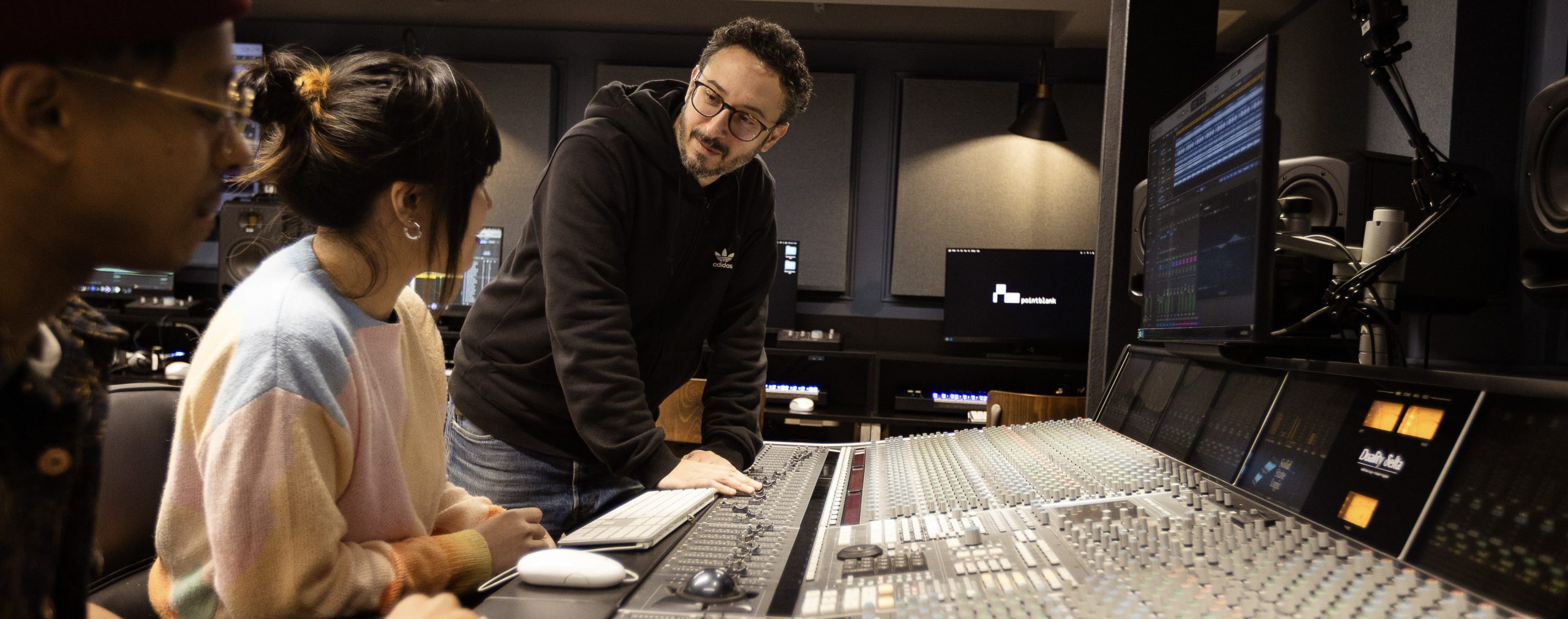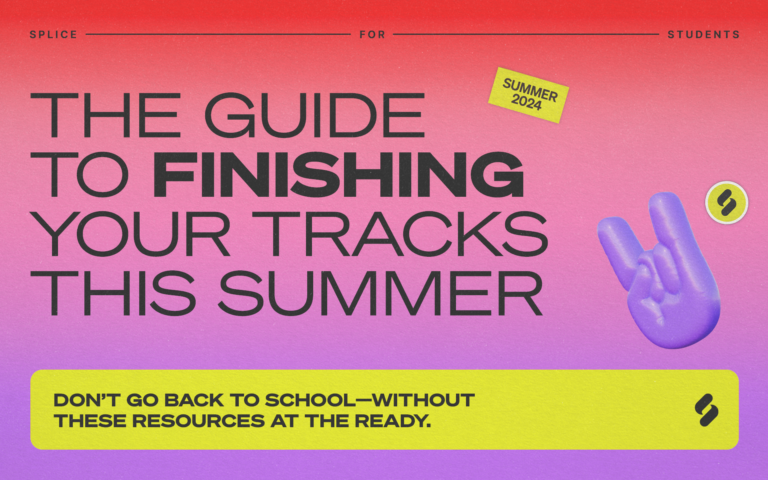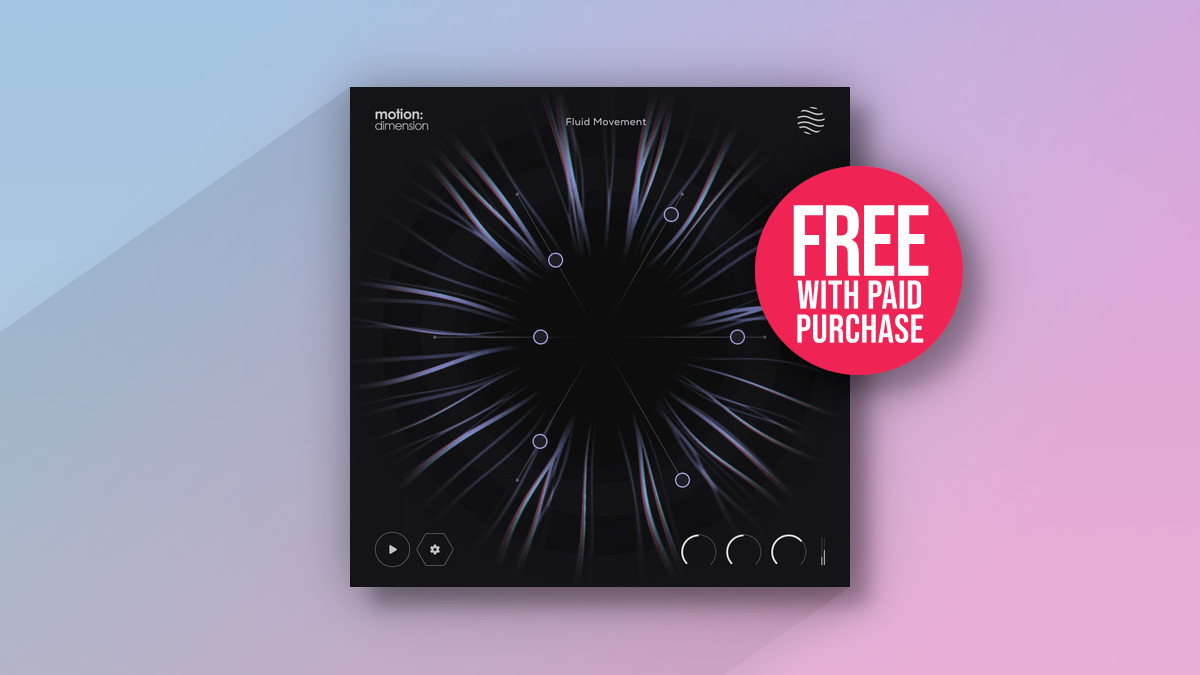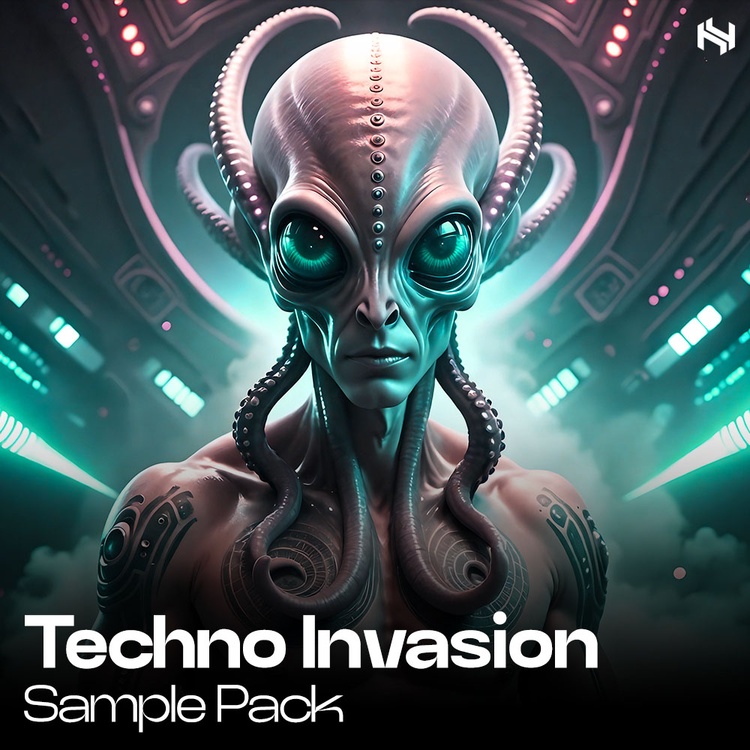Music Industry Advice: Ben Klein talks Jai Wolf and Chet Porter
 Here at Heroic Academy, we believe in sharing our secrets – especially when it comes to music industry advice. We’ve shared everything we’ve learned through our journeys with our artists – the exact strategies that led to our growth and success as well as what we learned from our mistakes and missed opportunities. But we certainly don’t know everything, and … Read More
Here at Heroic Academy, we believe in sharing our secrets – especially when it comes to music industry advice. We’ve shared everything we’ve learned through our journeys with our artists – the exact strategies that led to our growth and success as well as what we learned from our mistakes and missed opportunities. But we certainly don’t know everything, and … Read More


Here at Heroic Academy, we believe in sharing our secrets – especially when it comes to music industry advice.
We’ve shared everything we’ve learned through our journeys with our artists – the exact strategies that led to our growth and success as well as what we learned from our mistakes and missed opportunities.
But we certainly don’t know everything, and our path to success isn’t the only path. Every story is different, and everyone has something to teach.
So, we decided to look outside of our team. We reached out to a number of managers and industry professionals to see if any of them would be down to share their music industry advice – their stories and secrets – and they were.
In this series, I’ll be sharing the results of my interviews with these experts – the stories of their successes and the strategies that got them there, from broad mindsets to specific techniques.
To kick off the series, I interviewed Ben Klein, founder of Kubic Management and manager of Jai Wolf and Chet Porter. Ben has been with these artists since early in their careers, and now they’re headlining tours, playing festivals worldwide, and living their dreams.
Naturally, Ben had some phenomenal music industry advice to share from his journey, and he was excited to help out.
***
We are at a pivotal moment in Ben and his artist Jai Wolf’s careers. Jai Wolf wanted to align himself with Odesza, and this was their one chance to really make it happen…
“We got connected with Odesza’s manager – they were starting a new record label called Foreign Family Collective, and they wanted us to do a release; if we finished a song by a certain date and they wanted to release it, they’d give us a spot to play at Bonnaroo, which is one of the biggest festivals in the world now.
About a week before the deadline, we had nothing working out. And Jai Wolf was like, ‘Screw it, I’m just gonna make something new,’…”
Getting Started
Every success story has its beginning. Ben’s began when he was 19:
I remember when I started, when I said to myself, “I’m going to do music professionally” – I was in school, and I had a lot of free time. I was hanging out with friends, partying, doing stuff typical college kids do. And I realized, I could be more productive. I asked, what can I do with what I love? What am I familiar with?
When I was much younger, I’d taught myself how to play piano and how to sing – but I realized by 19 that I wasn’t going to be a professional musician. I just wasn’t quite good enough, but I still loved music.
So I said to myself, I still want to be involved in creating music and being a part of that process, because I love it.
I was really into music blogs at the time. Music blogs are still an important discovery tool, but they were the premium way that artists were breaking at the time, and I read them – that’s where I found my new music.
I realized, I can manage artists and then pitch them to editors at these sites and get them featured. I know that’s how artists are breaking. Perhaps I can be on the business side.
And then beyond that, I didn’t really know what I was doing. I had no clue how to be a manager, and I kind of just dove into it and had to figure it out.
There’s a valuable lesson in that piece of music industry advice – don’t be afraid to get started just because you don’t know everything. Ben definitely didn’t know everything, but he did know that that was okay. He had a passion and wanted to do something with it – he just had to leverage his existing strengths and know where he needed to grow.
Ben knew he had a passion for music and that he wanted to be a part of the business behind it. He also liked a number of a small rapper’s songs, and that’s all it took to get started:
I knew I liked this rapper’s music, so I wrote him a message on Facebook and said, “Hey, can I write you up a business plan? I think you’re amazing.” And he said “sure.”
There’s a lot to learn from what Ben just said. After all, he successfully enticed an artist to work with him in just one line. If you can master the next four takeaways from Ben’s message, you’ll be golden.
How to craft the perfect message
The first takeaway: he kept it short and sweet. You should do the same when you reach out to people.
Second, Ben started by immediately offering value. When initiating a conversation, it’s important to capture the other person’s attention, and people care most about things that make them better off. It’s simple, really; the rapper could benefit from having a business plan, so he’d be inclined to say yes.
Be smart about what you offer, though. Consider your strengths and background, and find ways to leverage those in helping others. Ben knew business, so he offered to build a business plan.
Also, bonus points if you can propose something with no downside (e.g. for free). In Ben’s case at the very worst, the rapper could just have ignored the business plan, and at best he’d have had the key to success. Either way, it was free.
Next, Ben provided context and explained why he wanted to help. Here’s why this third takeaway is important: if Ben had just sent “Hey, can I write you up a business plan?” with no other context, the rapper might have said yes. But it’s a bit strange to receive that kind of message out of the blue from someone you don’t know, and a lot of people are skeptical of spam.
Adding “I think you’re amazing” explained it all. Now, Ben’s offer wouldn’t be taken out of context. He was just a fan who wanted to help.
The fourth and final takeaway is that Ben made sure to flatter the rapper. It’s great that he did this alongside adding context, but don’t panic if you can’t find a way to merge these two. What’s important is that you tickle their ego in some way or another – perhaps congratulate them on a recent song’s success, or talk about a show you went to and loved. However, you have to be genuine – it’s easy to spot insincere flattery.
To summarize this crucial music industry advice, when reaching out to someone:
- Keep it short and sweet.
- Offer value quickly
- Provide Context
- Be genuine and flattering
Ben carried on:
I really didn’t know much at the time. But I learned a ton just working with him (the rapper), and having that experience was part of the reason I ended up managing Jai Wolf. So sometimes, you just have to dip your feet in the water and say, ‘F*** it. I’m just going to do it.’
Of course, it’s easy to say, “Get started.” But what does that actually mean?
Making Connections
In the music industry, getting started means making connections and providing value wherever you best can. I talked with Ben about his mindset and asked if he had any music industry advice on this:
I just did as much as I could and tried to be as active as I could.
If you’re ever in a position where you could go to a show or you could stay home, and you’re feeling a little tired, just push yourself and put yourself in those situations, and absolutely do the most that you can.
Do whatever you can to put yourself in a position to meet people; go to networking events, go to shows, message people on social media. Build a community for yourself – reach out to artists and share music, support others. Repost on SoundCloud and socials.
He’s right. If you put yourself out there, you always have the chance of meeting the right people that will help you achieve your goals. You might not meet anyone, sure. But you also might meet the next Jai Wolf, and ask yourself – would you want to miss that opportunity?
From here, Ben and I talked about some specific things artists and managers can do to build relationships with each other.
As an Artist
Before seeking out a manager, you’ll want to establish some degree of support around your music and brand. With the saturation of the modern music industry, it’s tough to do this alone. Ben’s music industry advice is to start by building a network of other artists:
Just find other creators whose music you like, and let them know! Form a connection, and ask if they would mind if you sent some new releases for feedback – or if they’d want to collaborate on something.
The biggest thing in building a sense of community is finding other artists that you genuinely like. And if they happen to be around you physically, that’s even better. Just be active in music discovery, proactively reaching out to those artists, building a community.
That’s probably the best music industry advice I have on this – just don’t be afraid to reach out to people, build relationships, and collaborate.
Check it out: it doesn’t matter if you’re in a city like Los Angeles or not – the internet allows us to connect with anyone, anywhere. So if you can’t make connections in person, be active online. If you support another artist and share their work, it’s more likely that they’ll return the favor.
The benefits of collaborations and remixes
Also, collaborations are a great way to simultaneously grow your network and learn a ton – we wrote an article on the topic a while back.
If collaborating on new music isn’t your thing, don’t worry – remixes are another great way to reach new audiences and form connections:
I actually don’t think there’s one route for everybody. The most important thing is that you develop your sound, and you can do that through both originals and remixes. Just like a singer or a rapper has a unique timbre in their voice which distinguishes them, you as the producer have the underlying music distinguishing you.
You can do that in a remix – you can put your own flavor on something. And even though there’s definitely been a shift and remixes may not be having the same effect and impact as they were a few years ago, I think if you have an amazing remix, you can still accelerate your career significantly. It might also be a way for you to build key relationships and a portfolio.
Ben provides some strong music industry advice for artists in that last sentence. By remixing multiple works, you’ll have a portfolio of related content that showcases your production ability across different singers and styles; and since you’ve built it on proven-to-work vocals and lyrics, you’ll appeal to a larger audience.
Also, making a quality remix is a great way to get connected and develop a working relationship with another artist – if they love your take on one of their songs, they’ll probably contact you the next time they need a remix.
How to impress music managers
Remixes or not, if you’ve built that initial following and are at the stage of looking for a manager, pay attention to this piece of music industry advice. I asked Ben what it took to impress him and managers like him.
Something that’s really impressive to me is artists that have a really clear vision for who they are.
If you know exactly the type of artist you want to be musically, then you can say to yourself, who are the managers that represent the best artists within that ecosystem?
That gives you a direct target list of people you can reach out to.
We’ve given this advice, too. Look to your idols, see what they’re doing and who they’re working with. Gather a list of contacts, and continuously add to that list as your career progresses.
When you’re emailing them, make sure that you’re really articulate and succinct. Be sure to clearly describe who you are as an artist, what your music feels like, and where you feel it fits in. Say why you’re reaching out to them.
We touched on this piece of music industry advice before – it’s imperative to demonstrate value. If you have a track record of success, it helps to call that out. But what if you’re just starting out?
If you don’t have any data to back up your success, you’re probably less likely for the manager to listen. But it doesn’t mean they won’t.
If you’re very thoughtful, very succinct, and just come off as intelligent, you have a much higher chance of those people at least listening and maybe even giving you feedback on something.
Make sure you’re writing something that is going to have the highest likelihood of actually getting a response.
Revisit the four key takeaways from Ben’s business plan message and become a master at doing them – that’s how you’ll get people to listen and respond.
As a Manager
Okay, so what if you want to be a manager? How do you go about finding the right talent and connecting with them?
Ben thinks a lot of it is just being an active music listener, and we agree.
With SoundCloud and Spotify being the way they are today, you’ll always see the artists you like and the stuff they’re sharing.
Being a constant music listener, you’ll come across music that every once in a while will make you feel it in your bones. You hear it and you just feel it in every ounce of your body. You know, I want to be a part of this.
When you reach out to the artists, let them know that! Say: “This is the greatest thing I’ve heard, and I need to help you.”
The key piece of music industry advice here? Listen to a LOT of music, and share your excitement when you find something you love.
The importance of authenticity and shared values
Don’t be concerned with coming across as over-eager.
The way I think about it, I am who I am, and what comes to my head comes out of my mouth. When I get really excited about something, I just have to pay that forward. I’m not going to overanalyze anything – are these people going to think I’m too ambitious?
I want to work with people who, if they see I’m genuinely excited about something, are going to be attracted to want to work with me. I’m that person and I want to work with people who are like-minded to me.
That’s very, very important to me and I would give that music industry advice to everybody: if you don’t have the same values as the people on your team, it’s never going to work in the long-term.
Ben makes a great point, and he’s not the only one that has it. Everyone I interviewed for this series suggested the same piece of music industry advice.
Whether you’re an artist or other industry professional, it’s imperative to remain genuine and true to yourself, as that’s how you’ll find people like-minded to you. Besides, how are you going to find success if your team doesn’t share your vision?

Finding Your Label
Switching gears, Ben and I began speaking about the next steps in his journey. Once he’d found his core team, it was time to focus on turning his artists’ visions into reality. The artists were responsible for making great music, and Ben was responsible for getting it out to the world and monetizing.
Majors vs Indies
One of the first decisions that every project must encounter is which type of label they want to sign with (if they want to at all). There are plenty of opinions on whether indie or major labels are better, but the real answer is that one size doesn’t fit all.
We were trying to decide, do we sign with one of the top agencies in the world in terms of size and revenue, just in prestige? Or do we sign with this more niche agency?
The answer ties back to what I was saying earlier – know who you are as an artist, and know the direction you want to go. If you do, you can align yourself with the right team members that give you access to the right audience for your music.
Jai Wolf knew that he wanted to align himself with Odesza and Cashmere Cat, and that sort of indie-dance music. Their agents had reached out to us as a team to represent us before, and they’d put us on tour with those artists. We knew that this was where we had to go. So we signed with Windish, which then got absorbed by Paradigm.
Ben again calls out the importance of knowing your vision, and for good reason. Doing so allows you to identify similar artists who have already made it, which in turn gives you some degree of guidance as you create your own separate but similar path.
In fact, we believe in this piece of music industry advice so much that we dedicated an entire lesson in the Music Marketing Academy to discovering and identifying your vision and mission. And our top successful students agree – it’s been the most re-watched and re-visited lesson.
Ben continued:
Through Paradigm, we got connected with Odesza’s manager – they were starting a new record label called Foreign Family Collective, and they wanted us to do a release; if we finished a song by a certain date and they wanted to release it, they’d give us a spot to play at Bonnaroo, which is one of the biggest festivals in the world now.
About a week before the deadline, we had nothing working out. And Jai Wolf was like, “Screw it, I’m just gonna make something new,” and he just made Indian Summer in four days out of nowhere with this pressure to get it done.
A lot of stuff happened after that song came out – it became one of the most popular electronic songs of the last five years. We followed it up with an EP and more music that we’re developing now. We eventually signed with the indie label Mom and Pop.
There’s a strong piece of music industry advice in this story – you don’t need a major label to achieve major success. It’s more important to find the right label than it is to find the biggest, as the right one will truly believe in your vision and work to make it happen.
Choosing the right label
Ben concluded:
There’s no right way to do it, there really isn’t.
If you want to be an independent manager and build a business yourself, then do it. If you’re thinking about partnering with a bigger company, really have a clear sense of why you’re doing that.
And don’t rush into anything – audit the people you’re interviewing. Make sure you ask for references, talk to the artists that are with that label, talk to the people that left. Try to get an understanding of how they function and do what’s right for you.
Every situation is different – there’s no right or wrong way – just figure out what’s best for you based on you and your musical goals.

***
Growing Your Fanbase
Up through this point, we’ve largely discussed the high-level mindset and approach to growing one’s musical support network. We’ve covered some key pieces of music industry advice: the importance of knowing your vision, putting yourself out there, and demonstrating value.
All of that is just the beginning though – it serves as the foundation for your project’s growth.
Once you have your team and your vision, how can you actually build a fanbase? Ben had some great music industry advice:
You want to be frequent with your content – as long as the content is good and purposeful. There’s something to be said about the network effect: you post a lot of content, you’ll grow – that’s the underlying rule of the internet.
We also believe this to be fundamentally true, and it’s the basis for the primary strategy behind the Music Marketing Academy.
Capitalizing on momentum
It’s not just about being frequent, though:
It’s also about knowing when to accelerate your reach.
If a post is performing well, you probably want to boost it further. Understanding Facebook’s (and other’s) analytic tools is really important – for example the Facebook Pixel is really powerful. Be able to capture data and then retarget towards those fans.
Ben touches on a great business principle: if something is growing, do what you can to maximize that growth. There are plenty of articles and YouTube videos explaining the various analytical tools available to you, and we touch on a few in the Music Marketing Academy as well. If you don’t learn this stuff, you’re only missing out.
Make sure that when you’re posting and promoting content, have everything formatted for each social: for example, have vertical videos for Instagram stories – which are highly, highly effective. You can have swipe-ups direct people to a site, getting three to four percent click-through rates, which is outrageously high. But you have to have the content formatted correctly, and it has to be good and have a voice.
This step is simple, but important. Improper formatting is a clear indicator that you lack professionalism, and it can keep visitors from converting into fans.
Converting followers to fans
Lastly (and this is huge):
It doesn’t mean that just because you grow that you’re going to get a lot of fans – that’s where the good, defined content matters, because if the content has a voice and you’re able to post a lot, then you’ll get a lot of new people that are then going to become fans.
Ben makes an important point. Make sure the content you post aligns with your vision and your brand, and make sure it’s good. Obviously, you could grow a huge following by posting random memes on a regular basis – that doesn’t mean your followers are fans of your music, though.
As you do grow and gain popularity, make sure to stay true to your voice. The moment you accommodate your content to everyone’s feedback, that’s the moment you turn vanilla – and everyone tends to stop following you.

Creating Good, Interesting Content
Okay, okay, but what do you post? How do you create “good content”?
It comes back to knowing who you are as a brand.
As an artist, a lot of it is just being authentic to yourself. A lot of it is studying others – what are the ways a lot of your favorite artists are positioning themselves on socials? What are the sorts of filters they’re putting on their pictures? Are they in a lot of their photos? How exactly do they position themselves?
And then, which of them feels right for you and who you are as a person?
If we haven’t hammered down the importance of knowing your vision enough already, here it is again. If you can define your voice, you can use that as guidance for the content you post.
Notice that Ben also reiterated the benefit in studying others. If you’re asking yourself, “what type of content do I even post?”, look at your idols and copy them (be sure to add your own voice).
Getting the most out of each platform
We’ve found it also helps to break your content up by platform, and Ben agreed.
Any social media platform now has its own inherent function. Twitter is your voice, and YouTube is video, and so on.
To help, we’ve broken up each platform by its function so you can better organize your content:
- Twitter: Your voice and thoughts about the world: what do you want to say?
- YouTube: Long-form video content; what do you want your audience to watch?
- Instagram: Picture and short-form video content; what key images and clips support your brand? This is also a great place to showcase your daily life.
- Facebook: Multimedia hub; what do your fans need to know about you? This is a great place for a bio, tour information, and linking to your other socials.
- Snapchat and Instagram Stories: Picture and short-form video content; slightly more candid and interactive in form than the Instagram feed. What is your daily life like? How do you communicate with fans?
When answering these questions, keep your broad vision in mind. Think about how you want to communicate and achieve that, and think about how you can use your strengths to your advantage.
Also – don’t forget about the ‘social’ part of social media. Interact with your fans. Like, comment on, and share other people’s content (if you believe in it and it aligns with your brand).
How to connect with your fans
Here’s a solid piece of music industry advice: your following will be more loyal, and your socials will grow much more quickly, if people feel like they can connect with you.
Be self aware if you’re an artist.
If you’re very good looking and interesting, you might want to utilize that on YouTube or Instagram by creating a lot of visual content with yourself, because you’re a part of what’s attractive about the artistic brand.
If you’re incredibly funny or have a unique perspective, you might Tweet a lot or use Snapchat as that medium. It’s all about understanding what each platform’s unique value proposition is, and then being able to apply that to your artistry.
Your voice is the center of all of it – you’re putting your voice into your music and your brand. And if you know your voice, you’ll know how to format everything correctly.
Think, “what’s the message I’m trying to send?” at a high level, and then figure out how you want to format that for each social medium.
As an example, Ben and I talked briefly through his experience in working with Chet Porter, who’s developed a truly unique, lovable, and relatable persona.
Chet Porter is just a funny guy. He’s hilarious and in one word, candid.
He posts pictures of himself in the supermarket, like ‘here’s a watermelon’. He just posts pictures of himself being himself, and that comes across well and self-aware, and I think people flock to that.
Whatever your brand is, know it and reinforce it wherever you can.
***
Music Industry Advice Wrap-Up
There it is, the “secret” to Ben’s, Jai Wolf’s, and Chet Porter’s success.
We want to thank Ben Klein for his enthusiasm in being a part of this series, and for sharing his music industry advice, insight, and experience.
I had a wonderful time talking with him – he’s a super friendly dude who’s incredibly intelligent. If you want to learn more, you can follow him on Twitter @BK42291.
If you’re interested in learning more about Chet Porter and Jai Wolf (and learning from their success), you can find them at the following places:
Jai Wolf
Chet Porter
Ben leaves us with this final piece of music industry advice:
Be brave. Don’t be afraid to fail. And really spend time knowing who you are.
***
Thanks for reading, and please let us know your thoughts in the comments below. We hope you learned a lot, and we’ll be back with more music industry advice in the next article of the series!






